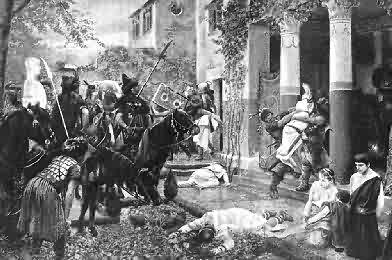The Huns
Huns, nomadic Asian people, probably of Turkish, Tataric, or Ugrian origins, who spread from the Caspian steppes (the areas north of the Caspian Sea) to make repeated incursions into the Roman Empire during the 4th and 5th centuries AD.

During the 3rd century BC some of the earlier segments of the Great Wall of China were connected to keep out a fierce nomadic people from Mongolia to the north. These tribes were called the Hsiung-nu. In the West they became known as the Huns. They were a nonagricultural people--animal herders who became expert horsemen. Gradually they worked their way westward across the grasslands of Central Asia until, in about AD 370, they appeared in Southeastern Europe in the last days of the Roman Empire. There, and also in Central Europe, they built a large empire of their own. In spite of the similarity in name, they are not connected with the modern Eastern European population of Hungary.
The Huns first overcame the Alani, another nomadic group, who lived on the plains between the Volga and Don rivers. They then moved on to overthrow the Ostrogothic kingdom between the Don and Dnestr rivers. By 376 they attacked the Visigoths in the area of what is now Romania, on the western shores of the Black Sea. For 50 years after their conquest of the Visigoths, the Huns remained a chronic irritant to both the Western and Eastern Roman Empires. They had established themselves in Europe and raided the Roman provinces along the Danube River. Early in the 5th century they apparently extended their authority over Germanic peoples to the west. Some Huns became soldiers for the Byzantine, or Eastern Roman, Empire
The Huns were outstanding warriors. Their feats as mounted archers astonished the Romans to the extent that they inspired great fear throughout Europe. For most of their history the Huns were governed by chieftains. Even on their military campaigns they seem to have had no single general. This situation changed in the 5th century.
By 432 the leadership of the Huns had become centralized under a strong ruler or king, like Rome and some of the Germanic tribes. King Rugila, or Rua, died in 434 and was succeeded by his two sons, Bleda and Attila. The two shared power until 445, when Attila killed his brother. Military and political leadership fell to him, and he proved to be a strong and autocratic ruler. Attila administered his vast empire through a group of emissaries. They went on diplomatic missions, served as commanders of military campaigns, and collected tribute from subject peoples.
It was the subject populations who eventually brought the downfall of the Huns' empire. Attila suffered a military defeat in Gaul (now France) in 451 and was driven from Italy by a plague and famine in 452. He died the next year and was succeeded by his many sons. They soon began fighting among themselves, and the subject peoples took the opportunity to launch a series of rebellions.
The Huns were decisively defeated in 455. The Byzantine Empire closed its frontiers and broke off trade relations with them. Sporadic raids by some of Attila's sons continued for a few years, but by the end of the century the Huns had disintegrated as a separate people.

